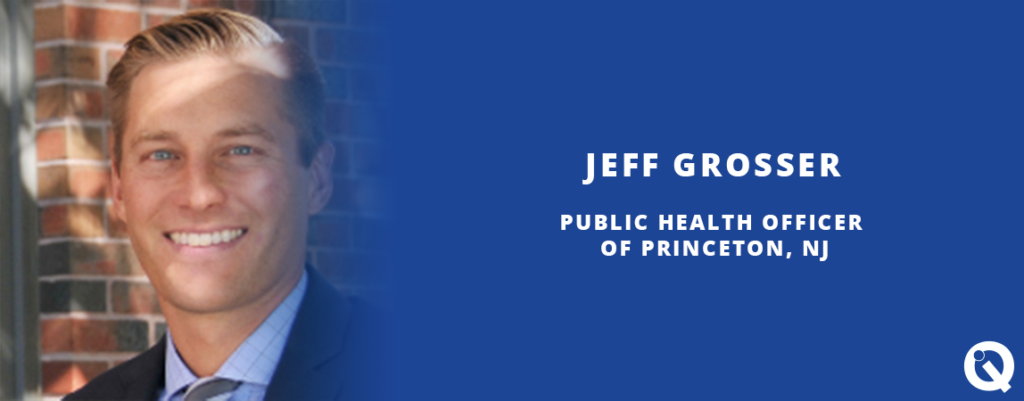Jeff Grosser is the Public Health Officer for Princeton. He spoke to us about the role of local health departments during the Covid-19 pandemic.
Why is supporting a public health infrastructure important in responding to the coronavirus?
At this moment, what we’re seeing right now, in terms of the worldwide pandemic, is how it’s hitting our local New Jersey communities, town by town. New Jersey is on the front lines of the national response. The importance of local public health infrastructure is more important now than ever because we’re seeing local health policy make huge inroads into flattening the curve. Public health is about preventing disease, but it is also about protecting those who are potentially vulnerable to specific illnesses.
New Jersey has about 90 county, regional, and local health departments. During this pandemic, our efforts are regularly coordinated with other towns, along with State officials.
Unfortunately, years of state funding cuts and understaffed local health departments have exposed some clear vulnerabilities in both the country’s and New Jersey’s public health infrastructure. What’s key in suppressing a disease outbreak is having public health professionals available to identify the source of the infection (called contact tracing). Another resource that is required in combatting disease outbreaks is personal protective equipment. Public health has long been the area of expertise to stockpile PPE and train users on how to properly use this equipment. Public health must continue to showcase its importance, long after this pandemic, to maintain our readiness to handle the next outbreak.
What does your health department do to help residents?
Obviously, a critical part of our work, from an epidemiological standpoint, is contact tracing. When we’re informed of a positive coronavirus case, we interview the individual and then reach out to any contacts that person may have had. What’s made contact tracing easier is the fact that the governor’s stay-at-home order has cut down on a lot of people’s travel. I take a lot of pride in finding out about a case and then following up with it immediately to try to suppress a transmission before it gets out of control. As COVID-19 continues to impact our community, and more residents return back to work, and begin to travel, we will be tasked with more expanded contact tracing.
Also, we assist retailers with implementing new federal, state and local guidelines. Being a smaller local health department, our staff members are able to make close connections with residents and businesses in town. We depend on these connections when implementing new policies.
How does Princeton work with the county public health department and the state?
Princeton has an autonomous Board of Health, meaning they have the authority to set policy and ordinances. The nine-member board of local experts guides the Princeton Health Department from various health backgrounds. Both the Board of Health and Princeton Health Department work with the Mercer County Division of Public Health when it comes to emergency response. Their resources go a little bit beyond ours with regards to public health emergency planning due to their establishment as a County LINCS (Local Information Network Communication System) entity. They’re our conduit to the state Office of Emergency Management. The state Health Department sets guidelines we must follow locally, and provides expertise in areas such as their communicable disease service, where epidemiologists analyze disease and trends.
Have you been able to use data to inform your decision-making?
Ever since Johns Hopkins University’s large-scale coronavirus dashboard came online, local authorities are able to show residents exactly what’s happening globally, and compare it to what is happening locally. We’re able to use data to determine if public health strategies like social distancing are working and if hospitalizations/COVID-19 incidence starts to decline. In Princeton, we have created a webpage dedicated to our local response so the public is aware of where we stand in the fight against COVID-19.
How does the Mayors Wellness Campaign and the Quality Institute help you?
The Mayors Wellness Campaign has allowed us to build relationships with the Princeton Senior Resource Center and senior living sites like Princeton Community Housing. With coronavirus, we’re seeing that the older adult population is getting isolated, and they’re at high risk of severe health complications. We are fortunate that we have fantastic relationships with those entities.
The Quality Institute provides a wealth of knowledge about local public health, health care systems, and different types of insurance and different types of policies. With regard to some of our community efforts — like social distancing, educating the public, mobilizing various social groups to either sew masks and distribute or help with food pickup and delivery — we’ve learned a lot of those community strategies through the Quality Institute.

